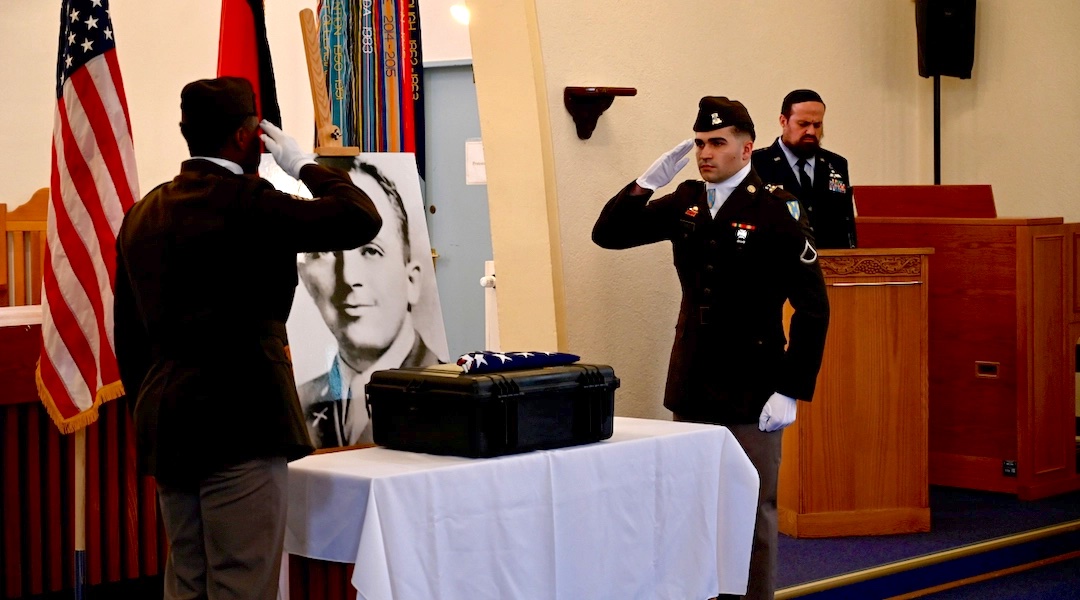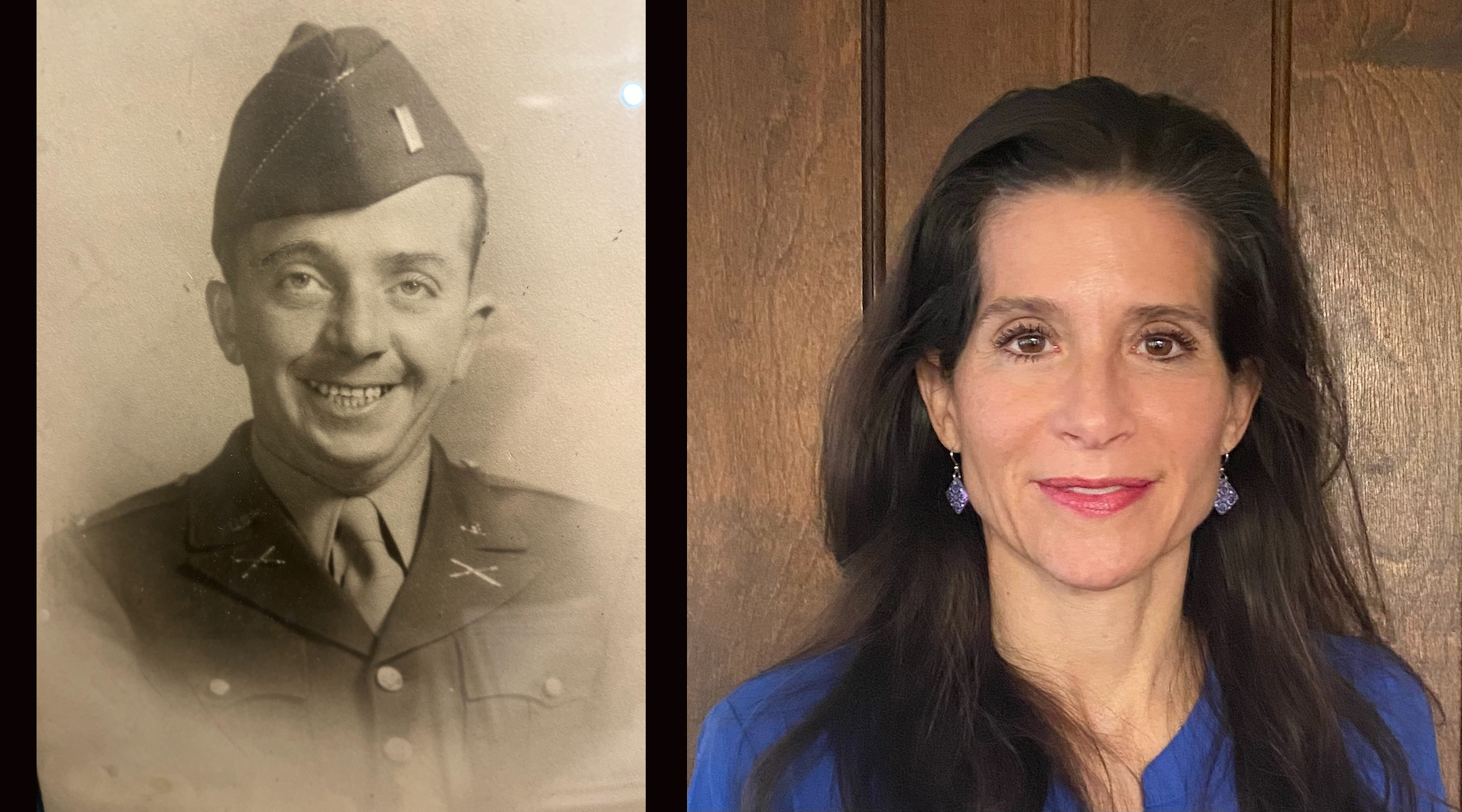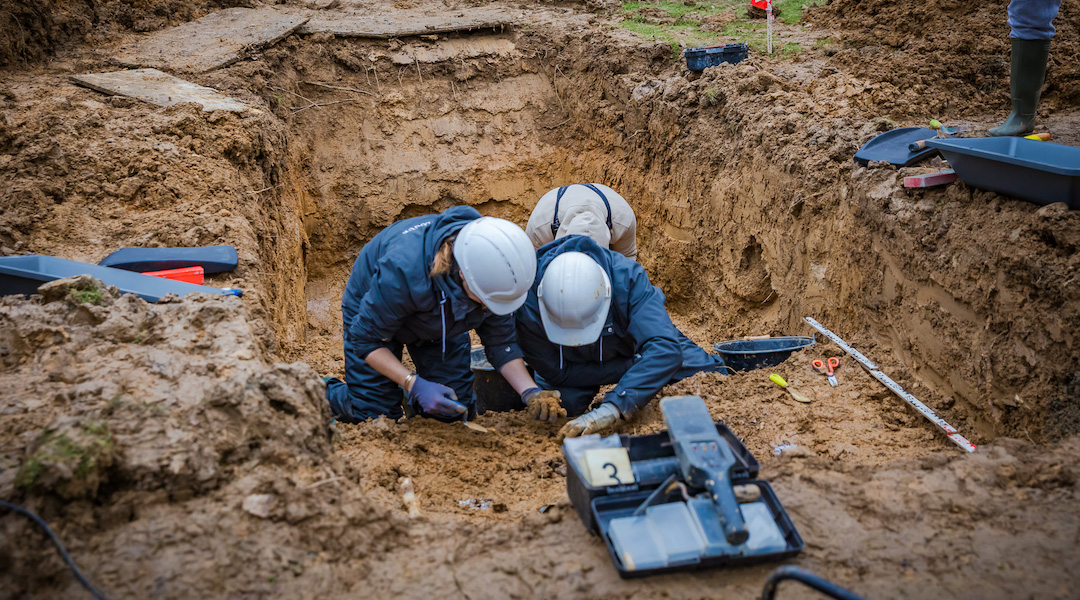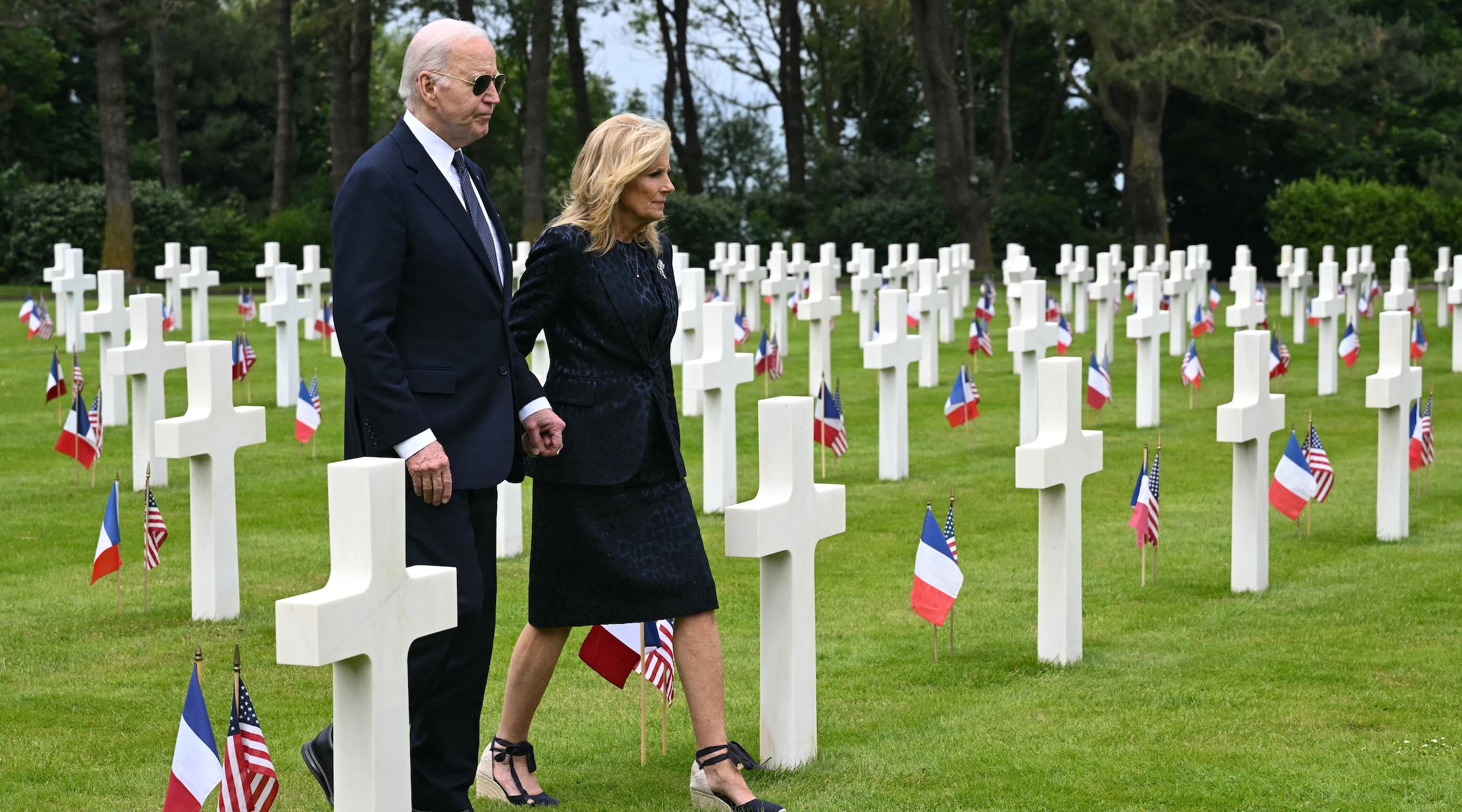In Normandy, a Jewish D-Day veteran buried in a Nazi mass grave will receive a proper burial 80 years later
Nathan Baskind was killed in action shortly after D-Day. A year-long investigation found his remains and ensured his reinterment under a Star of David

German and American soldiers at Ramstein Air Force Base, Germany honor Nathan Baskind’s remains after their excavation. (U.S. Army)
Growing up, Samantha Baskind’s father would sometimes mention his “Uncle Nate,” who stormed the beaches of Normandy on D-Day.
He called Nate “a great Jewish American war hero,” often just around Memorial Day, Baskind recalled. “He would always use that exact same phrase.”
There’s a family picture of Nate in his mid-twenties, just before shipping off to war, holding Baskind’s father as a toddler. But the family knew nothing of his fate, other than that the U.S. Army had declared him missing in action.
That all changed last year, when a tip arrived in the inbox of Operation Benjamin, a nonprofit that tracks down gravesites of Jewish American servicemen who were mistakenly buried under crosses. The tipster had recently visited a German-maintained grave site for Nazi officers, where the names of the dead were engraved on a plaque.
There, on the plaque, was an unusual and Jewish-seeming name: Nathan Baskind.
So began a yearlong investigation. Operation Benjamin came to determine that Baskind, a first lieutenant in the U.S. Army, had been shot behind enemy lines, died in a German P.O.W. camp, and was buried in a Nazi mass grave, where — despite being positively identified by the German war memorial commission — he went unidentified as an American Jew for eight decades.
With the help of Nathan’s grand-niece Samantha, who became the family’s point person, the group dug up the grave, identified stray bones of Nate’s remains, and worked with the German, French and American authorities to arrange for a Jewish reburial, which will be held in Normandy on June 23, the 80th anniversary of his death. It will fall just a few short weeks after ceremonies this week commemorating the 80th anniversary of D-Day, which are being attended by living World War II veterans as well as by President Joe Biden.

First Lt. Nathan Baskind, who stormed the beaches of Normandy on D-Day, was later killed and interred in a Nazi mass grave. His great-niece Samantha Baskind, right, has been working to ensure he gets a hero’s burial. (Courtesy Samantha Baskind/Operation Benjamin)
“It has felt overwhelming at times,” Baskind, an art historian at Cleveland State University who also teaches about the Holocaust, told JTA about spending the last year of her life immersed in her great-uncle’s history. “But it’s also an honor.”
The Baskind case was more intense than Operation Benjamin’s typical fare. Enlisting genealogists and excavators, the group has, to date, identified around 20 Jewish American soldiers whom the U.S. military had mistakenly buried under crosses and worked to give them Jewish burials instead. (Like other Jewish burial groups, Operation Benjamin places an imperative on burying the dead according to Jewish law, in particular with as many of their body parts intact as possible.)
But the group had never before uncovered a Jewish American who had been buried with the very Nazis he was fighting. The reverse, however, has occurred: In 2013, scientists determined that the head of the Nazi Gestapo, Heinrich Muller, had been buried in a Jewish mass grave.
“You can understand very well how meaningful it is for us to be able to bring a soldier buried with Nazis for so long into the bosom of his ancestral faith and his country,” Rabbi Jacob Schacter, president and co-founder of Operation Benjamin, told JTA. (The group’s other founder was real-estate developer Sheldon Lamm.)
Schacter got his first look at the grave holding Baskind during a 2023 trip to Normandy to attend the reburial ceremony of another Jewish soldier. Visiting the German cemetery, he recalled, he indulged in a bit of the theatrical.
“I got up on a little stone fence around the mass grave, and I said to him, ‘Nathan, we’re coming for you. We want to take you away from here. We want to bring you back to your home,’” Schacter said.
When they first contacted Samantha Baskind, she was working on her latest book: a biography of 19th-century Jewish American artist Moses Ezekiel, who fought for the Confederacy. A planned exhibit on Ezekiel’s work, curated by Baskind, was canceled by Princeton University in 2022 following blowback over his Confederate sympathies.
Soon, Uncle Nate’s burial became almost another full-time job to Baskind. She did extensive research into her family lineage and underwent DNA testing in order to determine a positive match. Meanwhile, Operation Benjamin worked with the Volksbund, a German war memorial commission that looks after the graves of officers including Nazis, to disinter the mass grave in search of Nate’s remains. (Schacter said he felt comfortable working with the memorial group, saying that its director “wears his German historical identity with an enormous amount of kindness and sensitivity.”)

The excavation of the Nazi mass grave where Nathan Baskind was buried, overseen by Operation Benjamin. (Sabina Cowdery/Anibas Photography)
Amid the extensive decomposition of the bodies, the excavators were able to identify two of Baskind’s bones. The whole process, including negotiations with the German, French and American governments, took over a year. Shortly before Memorial Day this year, Samantha hopped on a Zoom to plan Nate’s reburial arrangements and was surprised when a military representative who had been dispatched to her house presented her with Nate’s medals, including a Purple Heart. Just like her earlier Memorial Day conversations with her father, here was confirmation that Uncle Nate was a war hero.
The parallels with her academic work, she said, made her emotional.
“I’m doing research simultaneously on both of these men who fought, but for very different reasons,” she said. Part of her research into Ezekiel, she said, “uncovered canards about Jews and the military” held by mainstream society during the time period, including Mark Twain (who later recanted this stereotype and became an ardent champion of the Jews during his life).
“There was a lot of antisemitic conversation about how Jews shirked from their patriotic duties of the countries in which they lived, because they were only loyal to their own people,” she said. Decades later, Jews who fought in both World Wars — including Nate — would disprove these stereotypes by enlisting in large numbers.

President Joe Biden and First Lady Jill Biden walk among the 9,388 graves at the Normandy American Cemetery and Memorial after the U.S. ceremony marking the 80th anniversary of the World War II “D-Day” Allied landings in Normandy, in Colleville-sur-Mer, June 6, 2024. (Saul Loeb/AFP via Getty Images)
Inside the Pentagon, another influential figure was pondering what Nate’s story meant for Jews in the military. Jacob Freedman, the Jewish chief of staff to the U.S. Army secretary, read about the project to grant Baskind a Jewish burial. Freedman realized that he, too, was distantly related to the family: his grandmother was Nate Baskind’s second cousin.
Now, Freedman is working to ensure an Army representative will be present at Baskind’s ceremony, alongside Samantha and Operation Benjamin representatives, who also plan to attend.
“It is very meaningful for me to realize this connection,” Freedman, who was chief of staff to former Secretary of State Madeleine Albright, told JTA. “I think it’s a great reminder, particularly in this very fraught moment for the Jewish people, that Jewish Americans are really part of the fabric of the country. We have fought and died for the country and we are serving at all levels and in many different capacities today.”
Samantha’s father died over a decade ago. But after learning of Nate’s fate, she took to showcasing her old photo of him with his uncle in her office. When the Army asked her where she wanted her Uncle Nate to be buried, she considered the family plot in Squirrel Hill, a Jewish neighborhood of Pittsburgh. But ultimately, she said, “I wanted him to be in Normandy” — at the American cemetery for soldiers who died in combat during the invasion, a place she describes as “just cross after cross.”
“He’ll be in the American cemetery with a Star of David, amid all those crosses,” she said. “He’s being buried next to another Jewish soldier who died. He’ll be next to a Star of David.”
This article originally appeared on JTA.org.
A message from our Publisher & CEO Rachel Fishman Feddersen

I hope you appreciated this article. Before you go, I’d like to ask you to please support the Forward’s award-winning, nonprofit journalism so that we can be prepared for whatever news 2025 brings.
At a time when other newsrooms are closing or cutting back, the Forward has removed its paywall and invested additional resources to report on the ground from Israel and around the U.S. on the impact of the war, rising antisemitism and polarized discourse.
Readers like you make it all possible. Support our work by becoming a Forward Member and connect with our journalism and your community.
— Rachel Fishman Feddersen, Publisher and CEO

























